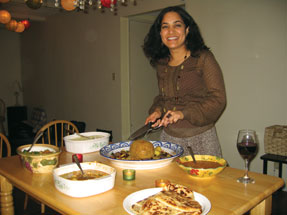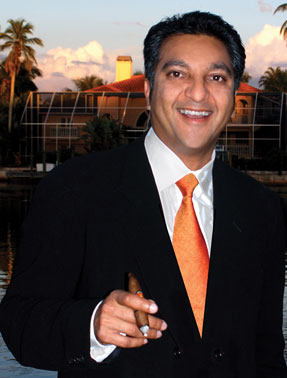Magazine
Split Personalities?

Indian immigrants strive for ways to balance their dual identities.
| Be yourself may well be the fundamental rule in confidence building, but Indian immigrants to the U.S. realize that they must sometimes bend its injunctions.
For some, this means adopting a different accent, for others it’s changing the way they dress, or how they socialize to even modifying their names. Each immigrant has his own sense of how best to integrate into American culture, each tries to find the right balance between being American enough and still remaining true to his Indian roots. “I feel that the challenge to fit in will never stop. But, I’ll never change my name. I’m never going to change my accent. I like my accent,” said Vipasha Dasgupta, a real estate executive from Chicago. Pratibha Swamy, senior security analyst at Visa, San Jose, Calif., draws the line at her stomach: “I never want to change my food habits. I’m a vegetarian.”
And, filmmaker Rajnesh Domalpalli, who came to the U.S more than 28 years ago, says: “I never feel the need to fit in. I am who I am. People respect you for being who you are and the work you do.” Harsh Doshi, a recent graduate of the University of Utah, Salt Lake City, says: “In college, I noticed that my Indian friend changed her accent whenever she spoke to Americans. I used to find it very funny. She sounded weird to me, but I think the Americans actually understood and related to her better because of it.” Nevertheless, Doshi prefers to stick to his Indian accent. “Changing you accent is not something I’d advise. If you can’t pull it off, you’ll end up sounding weird,” he said. “And my Indian friends will think I’m being fake, that I’m trying to suck up to the Americans. In India, talking in an American accent is looked upon as fake.” Changing one’s accent is vigorously debated in community circles. Some see it as a logical step in the cultural assimilation process, while others frown upon it. “If somebody changes their accent, it means they are trying too hard. I feel it’s not necessary, the Americans will like you even without it,” says Swamy. Domalpalli concurs: “Indians should be proud of where they come from. If someone were to tell me that I must pronounce the letter Z as ‘zee’ and not ‘zed’, I’ll say ‘that’s how you say it.’ When you show respect for your culture, people respect you.” I’m a Chameleon Sudarshan Setlur says that many Indian immigrants tend to stick together, which slows down their adaptation process. In college, Setlur, hung out only with Indian friends. “It didn’t give me the right exposure. Cliques tend to reinforce your prejudices,” said Setlur, a market intelligence expert at Ipreo in New York City. “You have that choice in college, but it changes when you start working.” Rocky Patel, owner of Rocky Patel Cigars, says: “You have to be able to adapt to the culture of the place you want to succeed in. You must be able to relate to the culture and the people.” He has certainly does so exceedingly effectively. Rocky Patel Premium Cigars is one the leading premium cigar producers in the country and Cigar Aficionado wrote the Patel is “one of the best-known faces in the world of premium cigars.” Swamy feels that cultural differences impedes some Indians in the workplace. “I’ve noticed at work, that Indians find it difficult to speak up. They don’t voice their opinions,” she said. “In India people are too polite, if you talk loud or too much, it’s seen as something bad. The U.S. is a country where people speak up and that’s how they are heard and that’s how things happen.” Real estate executive Dasgupta faces a different kind of challenge at her workplace. “In the office, I just don’t understand what they are saying when they are talking about sports, or movies, or use American idioms. I have to ask questions.” Relating to American sports and politics is often a necessary step in the cultural assimilation process, especially in the workplace. “My role is a customer-facing role, I need to know what’s happening here, in football, politics. Some Indians feel this is an extra effort because it’s not our country. If I’m in India, I’d know what’s happening in cricket,” said Nirali Desai, an engineer at Virtela, Colo. Setlur says immigrants have to take the initiative to relate with friends and colleagues in the workplace. “I’m in someone else’s country, and I should extend my hand rather than expect them to do it. I try to understand American sports, politics, what makes them tick, what they like and I participate in that. But I also introduce the stuff I like to do to them. One of my American friends is now very interested in Bollywood movies.” For many Indian immigrants, Bollywood is the lifeline to home. “When I get sad I watch Bollywood songs on You Tube. I never miss any Hindi movie,” said Dasgupta. Imran Moin, a software engineer at Tata Communications in California, adds: “Bollywood will always be a part of my life. I’ve always watched every Bollywood movie and I think I’ll continue to do that until I’m 80.”
Moin travels to India at least once every two years to meet his family and he and his wife participate in local community events to stay connected with their roots. Swamy make sure she celebrates Indian festivals, visits the local temple and attends Indian concerts. “This October, for Diwali, I decorated the house with lights and had some friends over and we had a big feast. I also celebrated Thanksgiving with friends. I made tofu turkey. I cannot erase the years that I grew up in India. At the same time I’ve lived here since 13 years. I’m developing my own culture.” Domalpalli says he embraces both his identities. “India is where I was born. The U.S. gave me the skills, opportunities and freedom to do what I want. I don’t have to choose, I feel I belong to both nations.” “It’s like I have two personalities. It’s different when I’m with family in India and when I’m doing business and socializing here. I can switch,” said Patel, who travels to India every year. “I’m a chameleon.”
|


